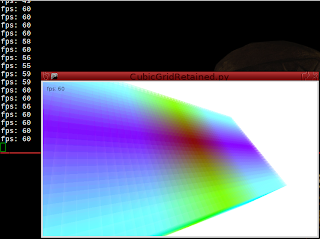1 # CubicGridRetained 2 # 3 # You may need to increase the maximum available memory 4 # by passing -mx1000m to jvm (in run script if you use that) 5 # 6 BOX_SIZE = 20 7 MARGIN = BOX_SIZE * 2 8 DEPTH = 400 9 boxFill = None 10 grid = None 11 fcount = 0 12 lastm = 0 13 frate = 0 14 FINT = 3 15 16 def setup(): 17 size(640, 360, P3D) 18 frameRate(60) 19 noSmooth() 20 noStroke() 21 global grid 22 grid = createShape(GROUP) 23 24 # Build grid using multiple 25 for i in range(-DEPTH / 2 + MARGIN, DEPTH / 2 - MARGIN, BOX_SIZE): 26 for j in range(-height + MARGIN, height - MARGIN, BOX_SIZE): 27 for k in range(-width + MARGIN, width - MARGIN, BOX_SIZE): 28 # Base fill color on counter values, abs function 29 # ensures values stay within legal range 30 boxFill = color(abs(i), abs(j), abs(k), 50) 31 sz = [BOX_SIZE, BOX_SIZE, BOX_SIZE] 32 cube = createShape(BOX, sz) 33 cube.setFill(boxFill) 34 cube.translate(k, j, i) 35 grid.addChild(cube) 36 37 def draw(): 38 background(255) 39 40 hint(DISABLE_DEPTH_TEST) 41 42 # Center and spin grid 43 pushMatrix() 44 translate(width / 2, height / 2, -DEPTH) 45 rotateY(frameCount * 0.01) 46 rotateX(frameCount * 0.01) 47 global grid 48 shape(grid) 49 popMatrix() 50 51 hint(ENABLE_DEPTH_TEST) 52 global fcount, lastm, frate 53 fcount += 1 54 m = millis() 55 if (m - lastm > 1000 * FINT): 56 frate = float(fcount) / FINT 57 fcount = 0 58 lastm = m 59 print("fps: %d" % frate) 60 61 fill(0) 62 text("fps: %d" % frate, 10, 20) 63

